|
|
|
Sort Order |
|
|
|
Items / Page
|
|
|
|
|
|
|
| Srl | Item |
| 1 |
ID:
113543
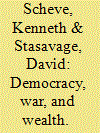

|
|
|
|
|
| Publication |
2012.
|
| Summary/Abstract |
In this article we use an original data set to provide the first empirical analysis of the political economy of inherited wealth taxation that covers a significant number of countries and a long time frame (1816-2000). Our goal is to understand why, if inheritance taxes are often very old taxes, the implementation of inheritance tax rates significant enough to affect wealth inequality is a much more recent phenomenon. We hypothesize alternatively that significant taxation of inherited wealth depended on (1) the extension of the suffrage and (2) political conditions created by mass mobilization for war. Using a difference-in-differences framework for identification, we find little evidence for the suffrage hypothesis but very strong evidence for the mass mobilization hypothesis. Our study has implications for understanding the evolution of wealth inequality and the political conditions under which countries are likely to implement policies that significantly redistribute wealth and income.
|
|
|
|
|
|
|
|
|
|
|
|
|
|
|
|
| 2 |
ID:
040791


|
|
|
|
|
| Publication |
London, Collier Macmillan publishers, 1973.
|
| Description |
xiii, 206p
|
| Standard Number |
0029018706
|
|
|
|
|
|
|
|
|
|
|
|
Copies: C:1/I:0,R:0,Q:0
Circulation
| Accession# | Call# | Current Location | Status | Policy | Location |
| 013051 | 332/BAR 013051 | Main | On Shelf | General | |
|
|
|
|
| 3 |
ID:
186427


|
|
|
|
|
| Summary/Abstract |
This paper uses household survey data from Australia to investigate whether renters face larger energy bills than otherwise similar households. We find that a negative unconditional effect of renting on residential electricity expenditure becomes positive when controlling for log net wealth, with renters on average spending about 8% more than otherwise similar households. This is a larger effect than in most prior studies. The effect operates via higher usage quantities rather than higher average prices, and a similar effect is found for overall residential energy expenditure including natural gas. Central to the story is that renters tend to have lower net wealth, and net wealth is associated with higher energy use due to reasons including additional appliance ownership. This makes net wealth an important control. The findings cast light on the potential for more ambitious policy responses to reduce energy-related disadvantages faced by renters in Australia. There is also scope for further research into whether similarly large effects are evident in other countries.
|
|
|
|
|
|
|
|
|
|
|
|
|
|
|
|
| 4 |
ID:
160848


|
|
|
|
|
| Summary/Abstract |
In the run-up to parliamentary elections in Mongolia, it is not uncommon for aspiring political candidates to distribute things like noodles, calendars and cash to citizens. Although the practice is prohibited, it continues to thrive under different guises. This article examines electoral gifting in Uvs, Mongolia, before the 2016 parliamentary election. Drawing on ethnography, it suggests that gifts provide citizens a tool to evaluate candidates while also affording candidates the opportunity to make aspects of themselves known publicly, often through the giving of items that express their economic acumen and business success. It reveals entanglements between politics and the economy, whereby the electioneering landscape is skewed in favour of individuals who can demonstrate that they are either a ‘big person’ who embodies access to wealth, or someone who has the ability to ‘do things’ to generate wealth. Instead of seeing gifting through the prism of democratic ideals, the article argues that the practice operates within culturally specific responsibilities and obligations.
|
|
|
|
|
|
|
|
|
|
|
|
|
|
|
|
| 5 |
ID:
103935


|
|
|
|
|
| Publication |
2011.
|
| Summary/Abstract |
In this paper, I investigate the long term effects of China's Great Famine in 1959-1961 on cohorts affected by the famine in the first year of life. Using China's 2000 population census data and after controlling for positive fertility selections in the famine, I find that women exposed to the famine in the first year of life had a lower probability of completing high school and lived in less wealthy households. I do not find any significant effects of the famine on men. In addition, I find that if positive fertility selections are not controlled for, the negative effects become weaker.
|
|
|
|
|
|
|
|
|
|
|
|
|
|
|
|
| 6 |
ID:
097374
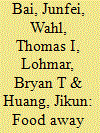

|
|
|
| 7 |
ID:
054245


|
|
|
|
|
| Publication |
London, Routledge, 2004.
|
| Description |
xxix, 384p.
|
| Series |
Routledge frontiers of political economy; no. 57
|
| Standard Number |
0415296536
|
|
|
|
|
|
|
|
|
|
|
|
Copies: C:1/I:0,R:0,Q:0
Circulation
| Accession# | Call# | Current Location | Status | Policy | Location |
| 048753 | 337/OHA 048753 | Main | On Shelf | General | |
|
|
|
|
| 8 |
ID:
152897
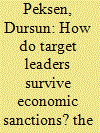

|
|
|
|
|
| Summary/Abstract |
What domestic policies do targeted regimes pursue to survive economic sanctions? Despite an abundance of research on the use and effectiveness of sanctions, scant research has been conducted on the domestic sources of the target's defiance to foreign pressure. This study explores the extent to which sanctions prompt the target regime to manipulate the domestic economic conditions through arbitrary confiscation and redistribution of private property and wealth. It is argued that economic coercion as a direct threat to political survival and coercive capacity of the target government creates incentives for politically insecure elites to engage in the policy of predation to counter the negative economic effects of the coercion on themselves and their constituency. Using time-series cross-national data from 1960 to 2005, the results indicate that as sanctions exact significant economic damage on the economy, the target government is more likely to pursue predatory policies. Further, the suggested impact of sanctions on property rights abuses does not appear to be conditioned by political regime type of the target and the involvement of the United States or multiple countries in the imposition of sanctions. Focusing on the government use of predatory policies to evade foreign pressure, this study expands the current understanding of sanction ineffectiveness in pressuring the government to acquiesce to external demands. It also shows that one major inadvertent consequence of sanctions is the deterioration of the economic security and private property rights of citizens in target countries.
|
|
|
|
|
|
|
|
|
|
|
|
|
|
|
|
| 9 |
ID:
182773


|
|
|
|
|
| Summary/Abstract |
In Chinese cities, migrants with rural hukou, compared to residents with local urban hukou, face more uncertainty, have limited access to mortgage finance, and are less eligible for low-cost housing. A simple model demonstrates that for these reasons, rural-to-urban migrants are less likely to own housing units in cities and as a result accumulate less wealth. Our empirical analysis examines a nationally representative household survey from 2013 and uses mother's hukou status as an instrumental variable. We find that household heads with rural hukou are about 20 percentage points less likely to own housing units in cities than comparable household heads with local urban hukou. Consequently, the average household head with a rural hukou owns 315 thousand yuan less housing wealth and 226 thousand yuan less total wealth than comparable household heads with local urban hukou. The average household head with a rural hukou has 288 thousand yuan less in housing capital gains than comparable household heads with local urban hukou. Moreover, we find that these differences are much larger in the first- and second-tier cities, cities with more stringent hukou regulations, and among younger cohorts.
|
|
|
|
|
|
|
|
|
|
|
|
|
|
|
|
| 10 |
ID:
118230
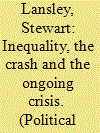

|
|
|
|
|
| Publication |
2012.
|
| Summary/Abstract |
The rise in inequality across many rich nations, but especially in the United Kingdom and the United States, was meant to lead to a bigger economic pie from which all would benefit. In fact, the increased concentration of income over the last three decades has led to more fragile and unstable economies making it a key cause of the 2008 Crash and today's lack of recovery. The evidence of the last 100 years is that models of capitalism that fail to share the proceeds of growth more evenly will eventually self-destruct. More equal societies have softer business cycles. In contrast, more unequal economies are associated with more extreme cycles-they have exaggerated booms, deeper falls and extended troughs. The scale of inequality is not just an issue about fairness and proportionality, it is therefore integral to economic health.
|
|
|
|
|
|
|
|
|
|
|
|
|
|
|
|
| 11 |
ID:
100028
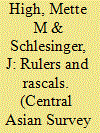

|
|
|
|
|
| Publication |
2010.
|
| Summary/Abstract |
This article examines the politics of gold mining in the Mongolian cultural region during the Qing period and today. By drawing on archival material and accounts by travellers of the period, the authors situate the current mining boom within its greater historical context. Since the exploration of gold has been surrounded by enduring notions of exclusivity and purity, the article shows how mining for gold has historically been closely related to Mongolian practices of political rulership. By examining the current mining boom in Mongolia from a broader historical perspective, the article argues that this extractive economy involves much more than a search for profit.
|
|
|
|
|
|
|
|
|
|
|
|
|
|
|
|
| 12 |
ID:
028456


|
|
|
|
|
| Publication |
New York, Columbia University Press., 1977.
|
| Description |
ix, 172p.
|
| Standard Number |
0231041101
|
|
|
|
|
|
|
|
|
|
|
|
Copies: C:1/I:0,R:0,Q:0
Circulation
| Accession# | Call# | Current Location | Status | Policy | Location |
| 017068 | 341.75/SCH 017068 | Main | On Shelf | General | |
|
|
|
|
| 13 |
ID:
089554


|
|
|
|
|
| Publication |
2009.
|
| Summary/Abstract |
This paper investigates how ethnic minorities in rural China are faring compared with the ethnic majority. The village is the unit of analysis and large surveys for 2002 are used. Minority villages in northeast China are found to have a somewhat better economic situation than the average majority village, but minority villages in the southwest are clearly faring worse. Industrialisation, inputs in agricultural production, stock of human capital of the labour force, wage level on the local labour market as well as indicators of path dependency are all found to affect the economic situation of a village. Location is the single most important circumstance working against a favourable economic situation for minority villages in the northwest and particularly the southwest. Low village income results in long-distance migration for many ethnic minorities, but for some minorities their ethnicity hinders migration.
|
|
|
|
|
|
|
|
|
|
|
|
|
|
|
|
| 14 |
ID:
146149


|
|
|
|
|
| Summary/Abstract |
We examine the sector-specific distributive effect of war in the US economy. We argue that war generates sector-specific distributive effects via demand-side and supply-side mechanisms. We also claim that war's distributive effects materialize over time. Our empirical analysis utilizes a panel data set with 22,354 U.S. firms for the period from 1960 to 2007. It probes the impact of the U.S. Government's war making on firm performance in the U.S. arms and non-arms (hybrid and civilian) sectors in both the short and long runs. Our analysis shows that war does not always affect U.S. non-arms sectors adversely. Indeed, war exercises a positive total long-run effect for these sectors. It also finds that the supposedly positive distributive effect of war for U.S. arms sectors proves weaker than analysts generally assume. Finally, it demonstrates that war-induced demand and supply shocks can explain these results. Overall, our research sheds light on a relatively understudied aspect of war and advances the general understanding of the political microeconomy of war making.
|
|
|
|
|
|
|
|
|
|
|
|
|
|
|
|
| 15 |
ID:
037559


|
|
|
|
|
| Publication |
New Delhi, Halyani Publishers, 1982.
|
| Description |
xii, 302p.
|
|
|
|
|
|
|
|
|
|
|
|
Copies: C:1/I:0,R:0,Q:0
Circulation
| Accession# | Call# | Current Location | Status | Policy | Location |
| 021458 | 330.16/GIL 021458 | Main | On Shelf | General | |
|
|
|
|
| 16 |
ID:
138604
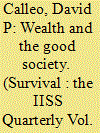

|
|
|
|
|
| Summary/Abstract |
Thomas Piketty’s Capital in the Twenty-First Century has attracted a great deal of attention, and deservedly so. It is a seductive book that soars above the myopia of ordinary economic analysis. It summons rich visions of the past and future and explores their myriad linkages. The result is a complex chain of arguments, inevitably with disruptive disconnections.
In the end, perhaps the author suggests more redistribution than his proposals
would deliver.
|
|
|
|
|
|
|
|
|
|
|
|
|
|
|
|
| 17 |
ID:
168517
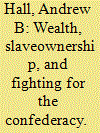

|
|
|
|
|
| Summary/Abstract |
How did personal wealth and slaveownership affect the likelihood Southerners fought for the Confederate Army in the American Civil War? On the one hand, wealthy Southerners had incentives to free-ride on poorer Southerners and avoid fighting; on the other hand, wealthy Southerners were disproportionately slaveowners, and thus had more at stake in the outcome of the war. We assemble a dataset on roughly 3.9 million free citizens in the Confederacy and show that slaveowners were more likely to fight than non-slaveowners. We then exploit a randomized land lottery held in 1832 in Georgia. Households of lottery winners owned more slaves in 1850 and were more likely to have sons who fought in the Confederate Army. We conclude that slaveownership, in contrast to some other kinds of wealth, compelled Southerners to fight despite free-rider incentives because it raised their stakes in the war’s outcome.
|
|
|
|
|
|
|
|
|
|
|
|
|
|
|
|
| 18 |
ID:
116543
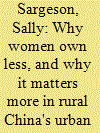

|
|
|
|
|
| Publication |
2012.
|
| Summary/Abstract |
As the amount of wealth in China's economy grows, so too does the size of the gender asset gap. Nowhere is this gap more extreme, or its consequences for women's future wealth, subjectivity, and agency more serious, than in peri-urban sites where the conversion of farmland for development has sent property values skyrocketing. This article explores how the gender asset gap is being reproduced in the course of rural China's urban transformation. It queries the plausibility of the most common explanations for this gap, and suggests that Charles Tilly's theory of categorical sources of "durable inequality" offers a useful corrective to those explanations. Drawing on data collected from interviewees and survey respondents in Zhejiang, Fujian, Hunan, and Yunnan provinces between 2004 and 2012 and from secondary sources, the paper illustrates how, when villagers are compensated for the expropriation of their land and demolition of their agricultural and business activities and housing, Village Committees, patrilineal households, and local government authorities utilise gender categories to resolve distributional problems and differentially compensate men. Women become less likely than men to be acknowledged as, and have the capacity to fully act as, the owners, managers, and users of the assets whose value increases as a result of urbanisation.
|
|
|
|
|
|
|
|
|
|
|
|
|
|
|
|
|
|
|
|
|